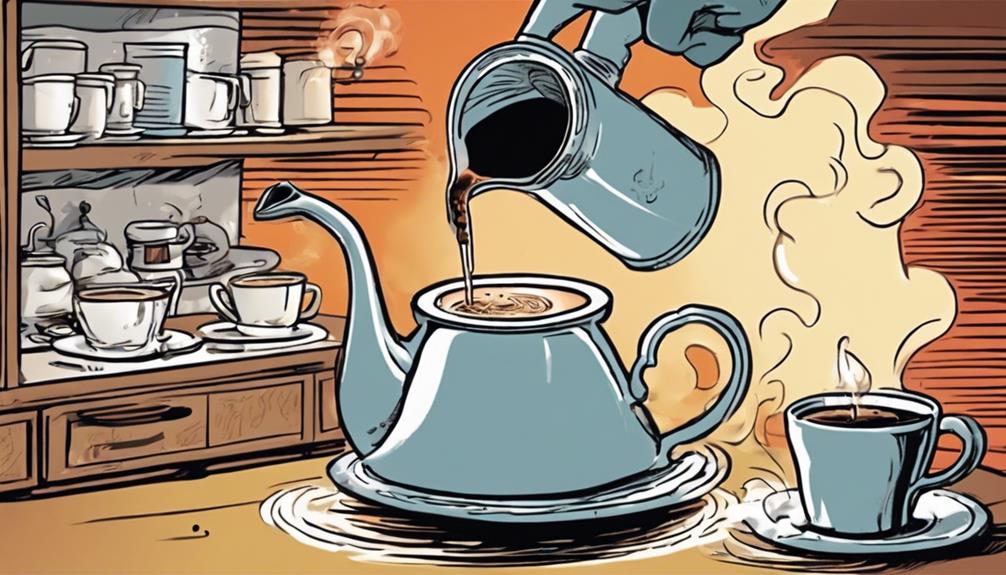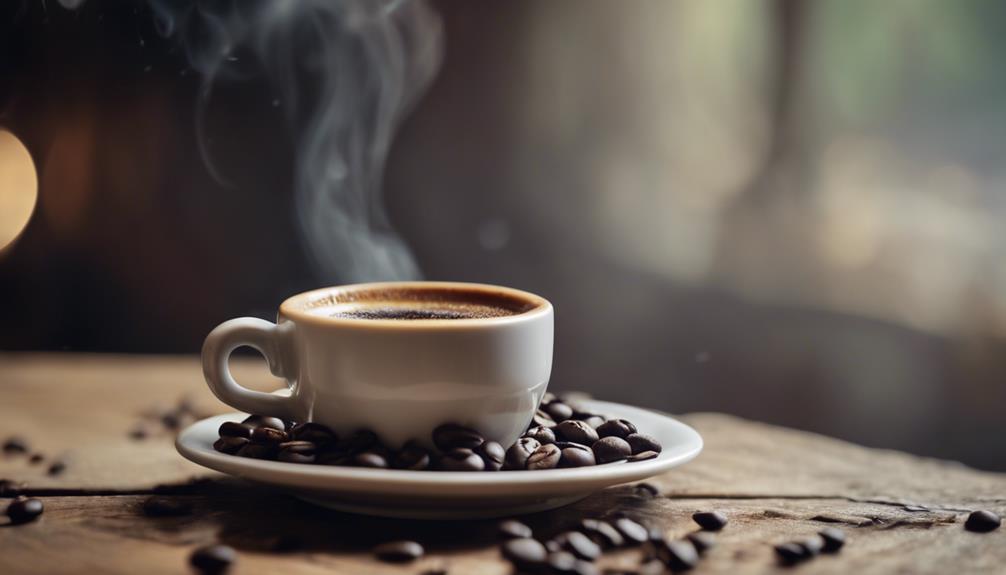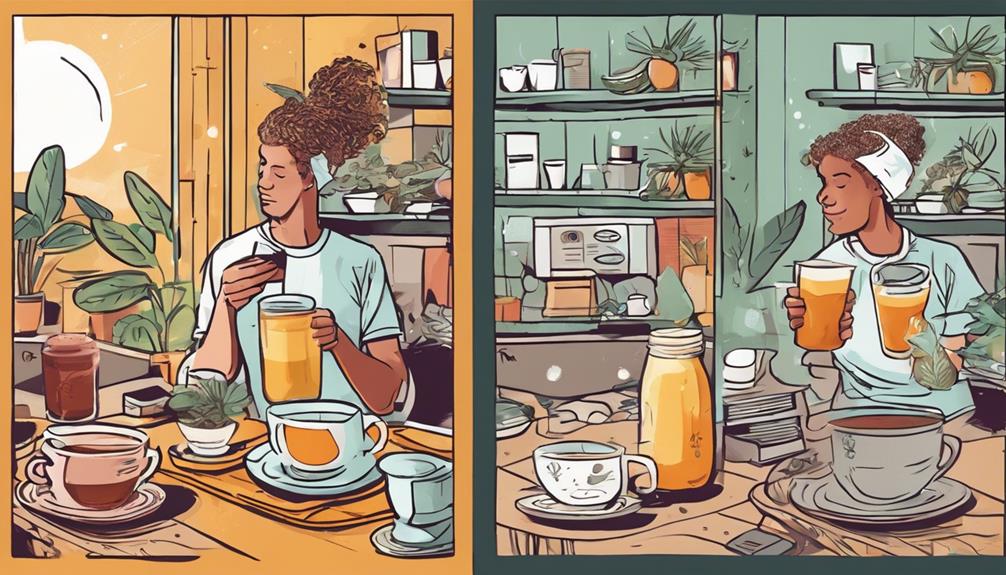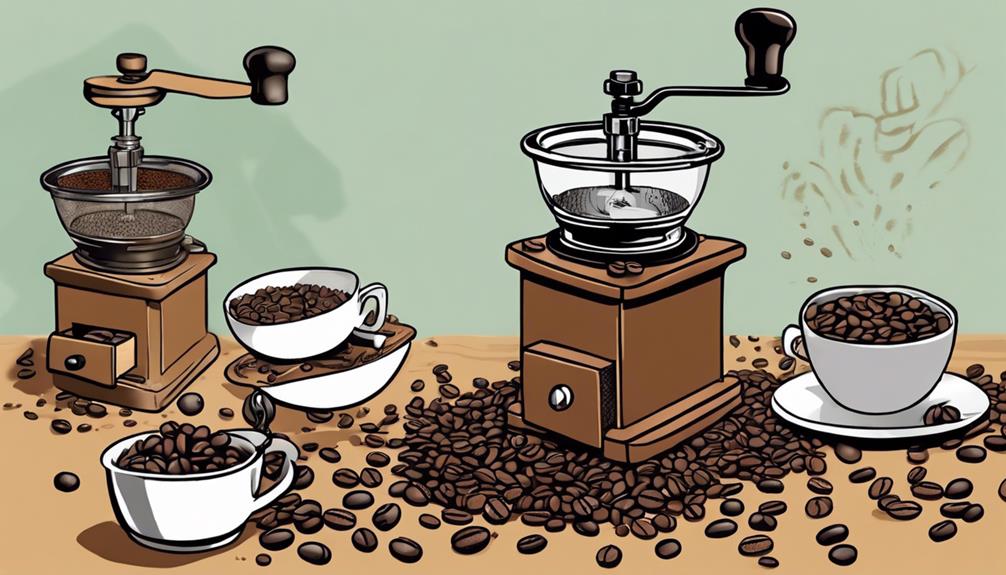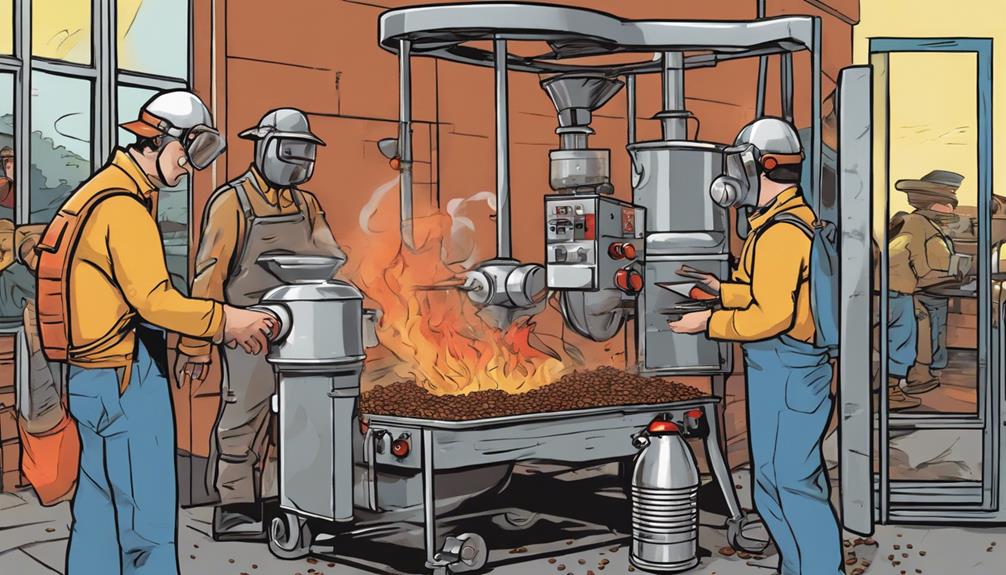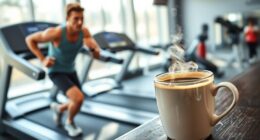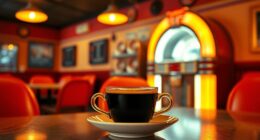To make the perfect cup of coffee, start by selecting a brewing method such as French press, pour-over, or drip. Follow the suggested coffee-to-water ratio of one to two tablespoons per six ounces for a flavorful extraction. Experiment with various techniques to achieve different taste profiles – pour-over for a clean taste or espresso for a rich intensity. Use good quality water, freshly roasted beans, and the correct grind coarseness. The type of filter you use is important, so choose a high-quality one. Keep the water temperature between 195°F to 205°F to prevent bitterness. Take care of your equipment to ensure consistent results.
Key Takeaways
- Use freshly roasted beans and grind just before brewing.
- Maintain proper coffee-to-water ratio for flavor extraction.
- Control water temperature between 195°F to 205°F.
- Experiment with different brewing methods for diverse flavor profiles.
- Invest in good quality filters for enhanced flavor and experience.
Brewing Methods
When brewing coffee, various methods such as pour-over, French press, drip machines, AeroPress, and espresso machines are commonly used to extract flavors from coffee grounds. Each method offers a unique way to brew your coffee to suit your taste preferences.
The French press method involves steeping coarse coffee grounds in hot water before pressing them down with a plunger to separate the grounds from the brewed coffee. This method allows for a full-bodied cup with robust flavors as the coffee oils aren't filtered out.
Pour-over brewing, on the other hand, requires a slow and controlled pour of hot water over coffee grounds in a filter. This method allows for a clean and bright cup of coffee by evenly extracting the flavors from the grounds.
Drip machines automate the brewing process by dripping hot water over coffee grounds in a filter, making it a convenient option for those looking for an easy way to enjoy a freshly brewed cup of coffee.
Coffee-to-Water Ratio
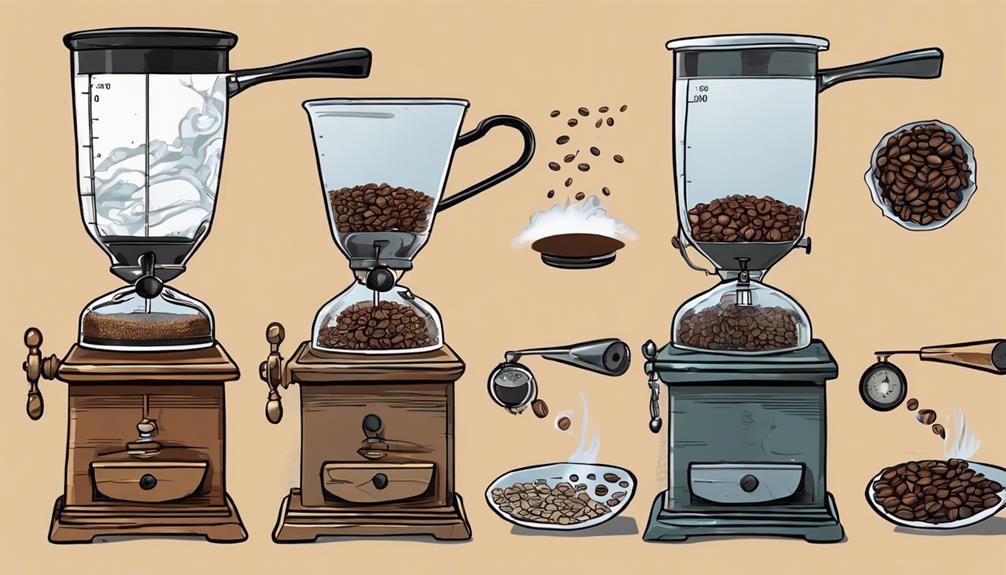
To achieve a well-balanced and flavorful cup of coffee, mastering the coffee-to-water ratio is necessary. The Golden Ratio, often recommended, is 1-2 tablespoons of coffee per 6 ounces of water. However, adjusting this ratio based on your personal taste preferences is essential. Proper measurement plays a pivotal role in achieving a balanced brew that suits your palate. Different brewing methods may also require slight variations in the coffee-to-water ratio to extract the best flavors from the beans. Consistency in the coffee-to-water ratio is crucial for ensuring a consistently delicious cup of coffee every time you brew. To help you visualize the importance of the coffee-to-water ratio, take a look at the table below:
| Coffee-to-Water Ratio | Guidelines |
|---|---|
| 1-2 tablespoons | per 6 ounces of water (Golden Ratio) |
| Adjust based on taste | preferences |
| Consistency is key | for a delicious cup of coffee |
Brewing Techniques
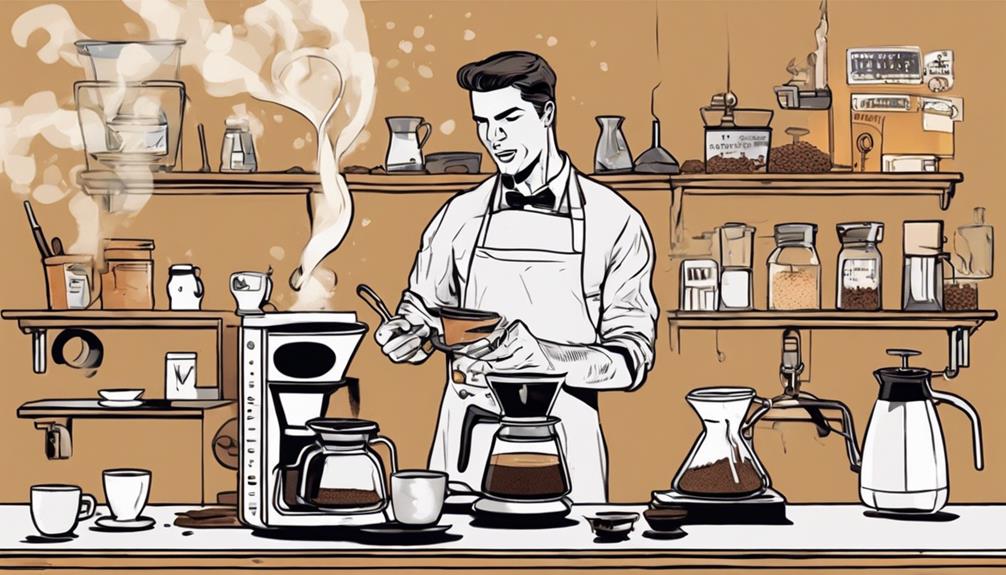
Mastering various brewing techniques is essential for accessing diverse flavor profiles in your cup of coffee. Each method – pour-over, French press, and espresso – offers a unique way to extract flavors from coffee grounds.
When you brew using a pour-over method, you slowly pour hot water over the grounds in a cone-shaped filter. This process results in a clean and nuanced taste that highlights the coffee's subtleties.
French press brewing involves immersing coffee grounds in hot water and allowing them to steep before pressing the filter down. This technique produces a rich and bold flavor profile that many coffee enthusiasts appreciate.
On the other hand, espresso brewing requires high pressure to force hot water through finely ground coffee, resulting in a concentrated and intense shot of coffee.
Each technique allows for experimentation with different flavor profiles, giving you the opportunity to tailor your coffee experience to your preferences.
Tips for Making the Best Coffee
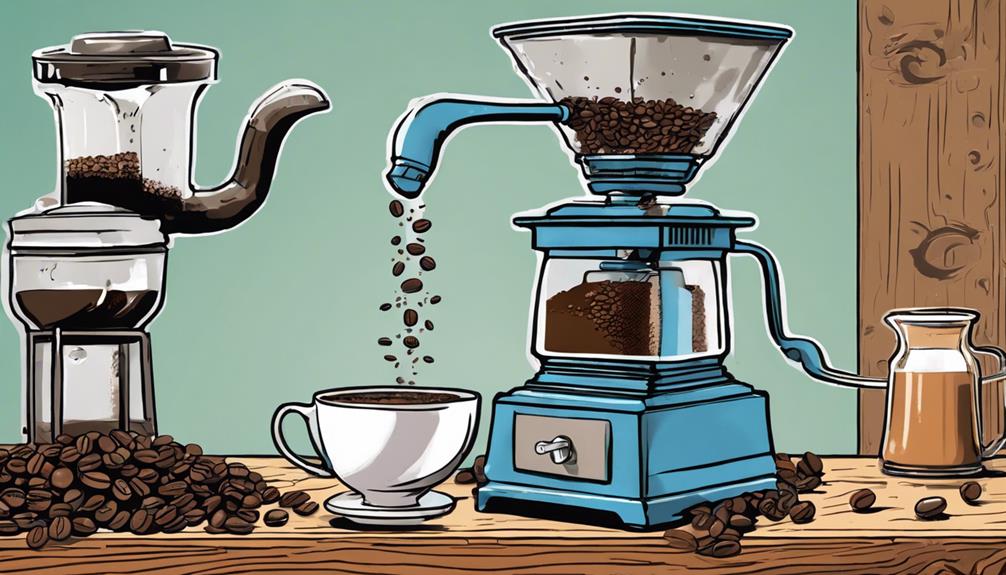
For best coffee quality, prioritize using good water to avoid chlorine affecting the taste. The water you use plays a significant role in the overall flavor of your coffee. Opt for filtered or bottled water to guarantee a clean, chlorine-free brew.
Additionally, the quality of your beans is vital. Invest in freshly roasted beans and grind them just before brewing to preserve their flavor. When it comes to the grind, choose the right coarseness based on your brewing method. A finer grind is suitable for espresso, while a coarser grind works well for French press.
Ensuring the correct coffee-to-water ratio is crucial for flavor extraction. Use 2 tablespoons of coffee per 6-ounce cup for best strength.
Filter Quality
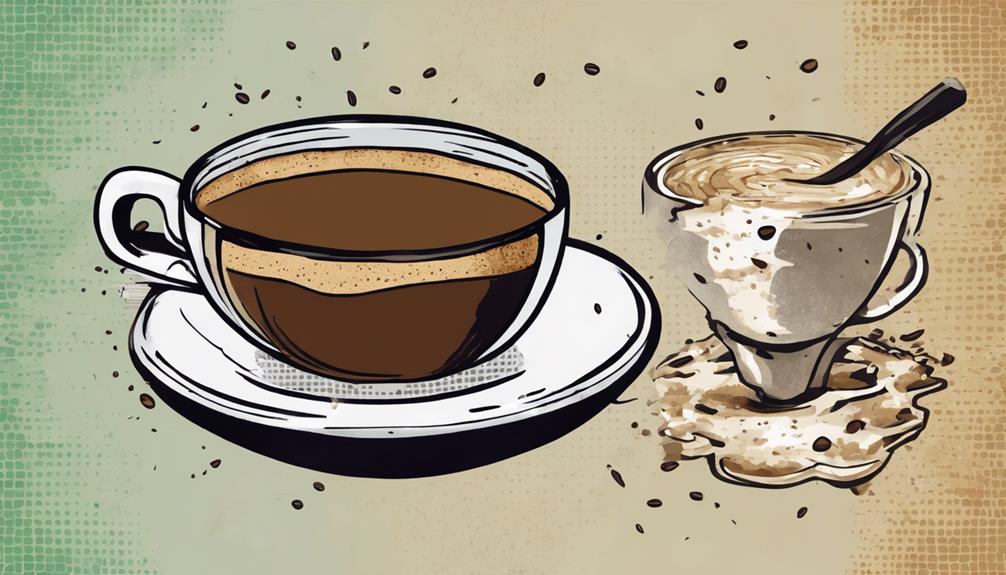
When brewing coffee, the quality of your filter plays an essential role in the taste of your final cup.
Opt for oxygen-bleached or dioxin-free paper filters for a cleaner brew.
Brands like Filtropa and Melitta offer quality filters that can enhance your coffee experience.
Quality Filter Importance
Investing in premium filters is crucial for enhancing the flavor profile of your coffee and ensuring a superior brewing experience. The quality of filters greatly impacts the taste of your coffee. Opting for filters such as oxygen-bleached or dioxin-free paper can improve the flavor by ensuring a clean extraction without any unwanted tastes.
On the other hand, using inexpensive filters can jeopardize the quality of your brew due to poor filtration, potentially resulting in changes in taste and aroma.
When selecting filters, consider reputable brands like Filtropa and Melitta to guarantee an excellent brewing experience. These brands are recognized for their quality and ability to deliver a delicious cup of coffee.
Remember, investing in premium filters is an investment in the overall coffee experience. While gold-plated filters offer maximum flavor retention, they might allow some sediment to pass through, affecting the clarity of your brew.
As a result, choose filters that align with your preferences and brewing method to achieve optimal results.
Filter Material Choices
Wondering which filter material choice best suits your coffee brewing needs for best flavor extraction and quality results? When it comes to filter material choices, opting for oxygen-bleached or dioxin-free paper filters is a wise decision. These filters are recommended for brewing quality coffee as they guarantee a clean and flavorful brew without any unwanted chemicals leaching into your cup.
While gold-plated filters can offer maximum flavor extraction, they may allow some sediment through, impacting the overall quality of your brew. To enhance the taste of your coffee, investing in quality filters like Filtropa and Melitta is a great choice. These filters are designed to improve the coffee's flavor profile, providing you with a delicious and aromatic cup every time.
On the other hand, it's important to steer clear of cheap filters as they can compromise the quality of your coffee. By selecting the right filter material, you can elevate your brewing experience and enjoy a consistently excellent cup of coffee.
Filter Brand Recommendations
For high-quality filter quality in your coffee brewing, consider selecting reputable brands like Filtropa and Melitta.
When choosing filters, select oxygen-bleached or dioxin-free paper filters for a clean and flavorful brew.
While gold-plated filters can enhance the taste, be aware that they may allow some sediment through.
Filtropa and Melitta are renowned for their quality filters that help produce excellent coffee by ensuring best extraction and minimal interference with the coffee's flavors.
It's essential to avoid using cheap filters as they can negatively impact the taste and aroma of your coffee.
Investing in trusted brands like Filtropa and Melitta will elevate your coffee brewing experience, providing you with a consistently delicious cup every time.
Brewing for Quality
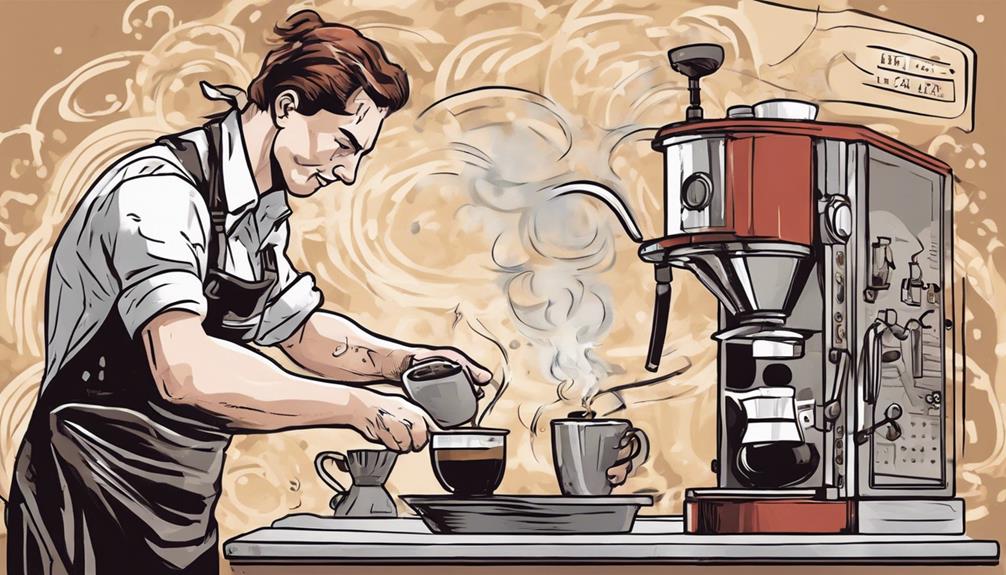
Achieving a high-quality brew hinges on utilizing the correct coffee-to-water ratio for best flavor extraction and avoiding bitterness. For a quality cup, aim for a coffee strength of 2 tablespoons of coffee per 6-ounce cup.
Water temperature plays an essential role in achieving the best flavor extraction, with 200°F being the sweet spot. Good coffee makers come equipped with automatic regulation to guarantee the water temperature remains consistent throughout the brewing process. This feature is crucial to obtaining a delicious and balanced brew every time.
Additionally, maintaining equipment cleanliness is important for brewing quality coffee. A clean coffee maker and accessories are necessary for preventing any unwanted flavors from affecting the final taste of your brew.
Temperature Control
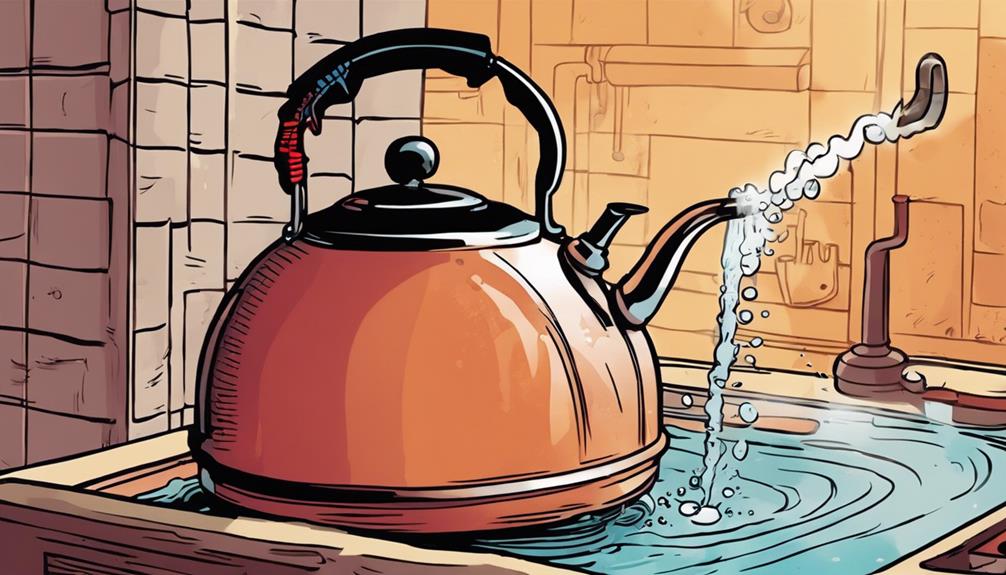
To guarantee a delicious cup of coffee, maintaining the ideal water temperature is crucial. By keeping the water between 195°F and 205°F, you can prevent bitterness and achieve a perfectly balanced brew.
Optimal Water Temperature
Maintaining the best water temperature when brewing coffee is crucial for accessing the finest flavors and avoiding bitter or under-extracted results. To achieve a flavorful cup, aim for a water temperature between 195°F and 205°F. Water that's too hot can extract bitter compounds from the coffee grounds, while water that's too cold may lead to under-extraction, resulting in a weak and lacking flavor profile.
If you're brewing coffee at higher elevations, where water boils at around 204°F due to reduced air pressure, you're actually in an excellent temperature range for brewing. This proximity to the ideal brewing temperature at higher altitudes can enhance the extraction process and lead to a well-balanced cup of coffee.
Preventing Bitterness
To prevent bitterness in your coffee, controlling the temperature during brewing is essential. Water temperature plays a pivotal role in the extraction process, with the best range being between 195°F and 205°F. Using water that's too hot can result in the release of bitter compounds, impacting the taste of your coffee.
It's important to avoid reheating or boiling coffee as this can also lead to a bitter flavor profile. Good coffee makers are designed to regulate water temperature automatically, ensuring that the brewing conditions remain ideal for a flavorful cup.
Additionally, prolonged warming of brewed coffee can further contribute to bitterness. To enjoy your coffee at its peak, it's recommended to consume it immediately after brewing. By paying attention to temperature control throughout the brewing process and avoiding extended warming periods, you can prevent bitterness and savor a delicious, well-balanced cup of coffee.
Equipment Care
Properly maintaining your coffee brewing equipment guarantees consistent temperature control for best flavor extraction.
When it comes to water temperature, aim for around 200°F for top-notch flavor without the bitterness that can result from water that's too hot.
Avoid the temptation to reheat or boil coffee, as this can lead to a bitter taste that affects the overall quality of your brew. Additionally, prolonged warming of coffee can alter its taste profile, so it's vital to brew fresh for the best results.
Investing in a good coffee maker can make a significant difference in your brewing experience. Quality coffee makers come equipped with automatic regulation features that ensure the water temperature is just right for proper brewing. By choosing a coffee maker with these capabilities, you can enjoy consistently delicious coffee without the need for manual adjustments.
Frequently Asked Questions
How Do You Make the Perfect Cup of Coffee?
To make the perfect cup of coffee, start by using fresh beans and grinding them just before brewing. Brew with water around 200°F and find the right coffee-to-water ratio for balance. Blooming the beans releases CO2 for enhanced flavor extraction.
What Is the Perfect Coffee Ratio per Cup?
In your coffee quest, remember this golden rule: 1-2 tablespoons of coffee per 6 ounces of water. It's the secret sauce for your perfect brew. Experiment, adjust, and savor the customized flavor just for you.
What Is the Solution to Brewing Perfect Coffee?
To brew excellent coffee, start by using fresh beans, grinding just before brewing, and nailing the right coffee-to-water ratio. Invest in a quality grinder for uniform grinds and maintain water temperature between 195-205°F for ideal flavor extraction.
How to Make the Perfect Cup of Filter Coffee?
To make the perfect cup of filter coffee, grind beans fresh for each brew, use quality filters, and brew at 195-205°F for 4-5 minutes. Follow a 1:16 coffee-to-water ratio for a balanced and flavorful cup that's practically heaven in a mug!
Conclusion
Now that you've mastered the art of brewing coffee, remember that the key to a perfect cup lies in the details. Like a symphony conductor, you must carefully orchestrate the brewing process to guarantee harmony in every sip. For example, pay attention to the water temperature, the coarseness of the grind, and the brewing time. Each of these factors plays a crucial role in determining the flavor and strength of your coffee. Additionally, here are some coffee machine assembly tips to ensure that your equipment is in perfect working order: always clean and descale your machine regularly, check for leaks or loose parts, and follow the manufacturer’s instructions for maintenance and care. By paying attention to these details, you can elevate your coffee-making experience to new heights. By mastering these finer points of the brewing process and maintaining your equipment properly, you are well on your way to becoming a coffee connoisseur. With dedication and attention to detail, you can continually refine your skills and deepen your appreciation for the art of coffee-making. As you continue along this journey, remember that the pursuit of perfection is an ongoing endeavor, but the rewards of a truly exquisite cup of coffee are well worth the effort. In addition to mastering the brewing process and maintaining your equipment, consider exploring different coffee roasting techniques to further enhance the flavor profile of your coffee. Experiment with light, medium, and dark roasts to discover how the level of roasting can influence the taste and aroma of your brew. By honing your skills in roasting, you can deepen your understanding of the complexities of coffee and expand your ability to create truly exceptional cups of coffee. With time and practice, you can become a true master of the art of coffee-making, able to produce consistently superb coffee that delights the senses and brings joy to those who savor it.
With the right methods, ratio, and techniques, you'll be able to create a coffee masterpiece that will awaken your senses and delight your taste buds.
Keep experimenting and perfecting your craft to brew the perfect cup every time.
Cheers to your brewing journey!
